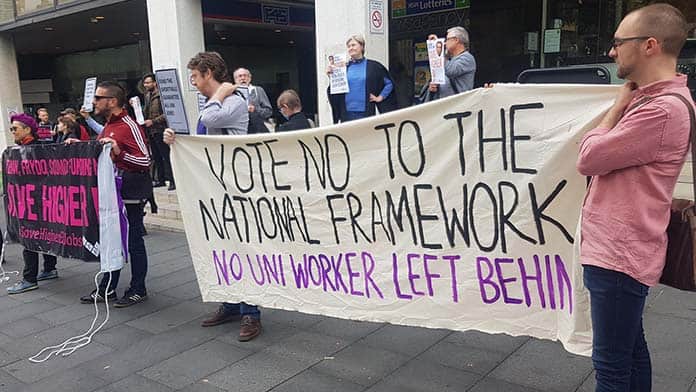A higher education National Day of Action (NDA) on 21 May saw university workers mobilise across the country demanding the Morrison government fund the $4.5 billion shortfall across the sector as a result of the COVID-19 crisis.
In most states the National Tertiary Education Union (NTEU) simply asked members to post selfies from home on social media.
But in person actions in Sydney and Melbourne in particular built union members’ confidence and began to show how it’s possible to fight, even amid current coronavirus restrictions.
In Sydney, the state branch organised a convoy of around 50 cars and 30 bikes that converged on the Liberal Party Headquarters on William St, with an on foot contingent of around 40 people waiting outside with banners and placards.
The official slogans called for public funding for universities and for JobKeeper to be extended to university workers—following the Morrison government’s deliberate decision to refuse universities any extra support, despite the COVID-19 crisis being directly responsible for the loss of billions of dollars in international student fees.
Some dismissed the actions as “left cover” for the union’s officials in the context of the National Agreement they negotiated with a team of university bosses, offering large cuts to wages in the hope managements might reduce job losses.
But rank and file activists also made sure calls for a no vote in the controversial national plebiscite on the Framework adorned cars on posters and liquid chalked messages.
Activists brought along a “Vote No to the National Framework—No Uni Worker Left Behind” banner to the on foot protest while the National Higher Education Action Network, a campaign group set up by rank and file members, handed out a leaflet arguing for a no vote and for a fightback to stop job losses.
The action followed the May 1 car convoy in Sydney, backed by a number of unions, which stood up to police pressure to call off the protest using the excuse of health guidelines.
Rank and file action
The NDA was called after rank and file members passed motions at local branches, including at the University of Technology Sydney, UNSW, Sydney Uni, RMIT and Melbourne Uni, calling for the union to mobilise members to demand the government step in to fund the shortfall in the sector and to fight to defend every job.
In Melbourne, a successful car and bike convoy was pulled together entirely by rank and file organisers from RMIT and University of Melbourne, in the face of opposition from the NTEU Victorian Division to “vote no” slogans being included in promotional material.
Not only did the state branch do nothing to mobilise members, it set out to obstruct organising efforts, deleting a Facebook event for the convoy set up by the Melbourne Uni branch. An online Zoom briefing organised through an NTEU account for the convoy was also mysteriously locked, so that no one could join it.
RMIT Branch President Sam Gibbard explained the reason for the protest by saying, “The Liberal Government and our Vice Chancellor should not just push the costs of this Covid-19 crisis onto already overworked staff. Casual staff have been sacked by email even though RMIT has a huge property portfolio, cash reserves, and a Vice Chancellor on a seven-figure salary.”
He added, “Staff should not be asked to cop potential cuts to pay and conditions, especially where many are already working excessive unpaid hours to support students”, opposing the push through the union’s National Framework to accept wage cuts.
Organisers met at the 8-hour Day Monument opposite Trades Hall before heading to the Liberal Party Headquarters on Collins St in the CBD. Around 40 staff and students gathered at the 8-hour Day Monument at the end of the convoy for a brief, socially distanced rally.
At the University of Sydney, another small in person protest gathered outside the F45 administration building in the afternoon over course cuts in the Faculty of Arts and Social Sciences (FASS).
The NTEU casuals network, who taped an open letter to the building, signed by over 300 members in the faculty, received an email later that night from Vice Chancellor Michael Spence, to “clarify” that cuts to courses in second semester would not be as high as the 30 per cent reported in the Sydney Morning Herald.
While “the fine detail” of course cuts was yet to be finalised, “preliminary indications from the six schools suggest an average of around 8 per cent”, he claimed. But the fight at the University of Sydney is far from over with management now signalling a 20 per cent increase in tutorial size in FASS and a number of courses on the chopping block at the Sydney Conservatorium of Music as well.
The day of action was part of the rank and file revolt that has helped kill off the NTEU National Framework, which was designed to offer Vice-Chancellors pay cuts of up to 15 per cent at campuses across the country.
We now face a fight campus by campus against variations to enterprise agreements and against job cuts.
The NDA was an important first step in mobilising the membership and building the confidence to fight—and a step towards the industrial action we will need to defend our jobs and conditions.
The union is now finalising plans for another national day of action. Rank and file activists need to go all out to mobilise and shape the next mobilisation into another defiant show of opposition to cuts.
By Ruby Wawn, NTEU member, UTS






